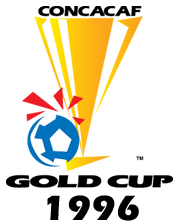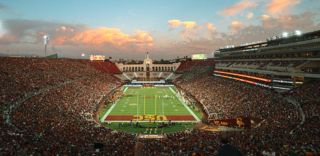
The 1991 CONCACAF Gold Cup was the first edition of the Gold Cup, the soccer championship of North America, Central America and the Caribbean (CONCACAF), and the eleventh overall CONCACAF tournament. The last time the CONCACAF Championship was held was 1971, from that point on the first-place finishers of World Cup qualifying were considered continental champions.

The 1996 CONCACAF Gold Cup was the third edition of the Gold Cup, the soccer championship of North America, Central America and the Caribbean (CONCACAF).
The 1998 CONCACAF Gold Cup was the fourth edition of the Gold Cup, the soccer championship of North America, Central America and the Caribbean (CONCACAF).
The 2000 CONCACAF Gold Cup was the fifth edition of the Gold Cup, the soccer championship of North America, Central America and the Caribbean (CONCACAF), and the 15th overall CONCACAF tournament. It was held in Los Angeles, Miami, and San Diego in the United States. The format of the tournament changed from 1998; it was expanded to twelve teams, split into four groups of three. The top two teams in each group would advance to the quarter-finals. Peru and Colombia were invited from CONMEBOL, and the Republic of Korea were invited from AFC.

The 2005 CONCACAF Gold Cup was the eighth edition of the Gold Cup, the soccer championship of North America, Central America and the Caribbean (CONCACAF). It was contested in the United States in July 2005. The United States emerged victorious in the final against an upstart Panama team led by tournament MVP Luis Tejada. After regulation and 30 minutes of extra time ended scoreless, the USA won 3–1 on penalties.
The 1998 FIFA World Cup qualification, CONCACAF zone ran from March 1996 to November 1997 in order to determine the three CONCACAF representatives at the 1998 FIFA World Cup. For an overview of the qualification rounds, see 1998 FIFA World Cup qualification.

The 2009 CONCACAF Gold Cup was the tenth edition of the CONCACAF Gold Cup competition, and the twentieth soccer championship of North America, Central America and the Caribbean (CONCACAF). It was played from July 3 to 26, 2009 in the United States. This competition was the fourth tournament without guests from other confederations. Mexico won their fifth Gold Cup, and eighth CONCACAF Championship overall, after beating the United States 5–0 in the final. It was the second consecutive Gold Cup final and fourth overall to feature Mexico and the United States and the third won by Mexico.
The 2009 CONCACAF Gold Cup group stage was played July 3–12, 2009.

The 2000 CONCACAF Gold Cup Final was a soccer match played on February 27, 2000, at the Memorial Coliseum, Los Angeles, to determine the winner of the 2000 CONCACAF Gold Cup. Canada beat Colombia 2–0. This was Canada's first Gold Cup title and its second major title, the first since the 1985 CONCACAF Championship. As the Gold Cup champions, Canada represented CONCACAF at the 2001 FIFA Confederations Cup in Japan.

The 1998 CONCACAF Gold Cup Final was a soccer match to determine the winners of the 1998 CONCACAF Gold Cup. The match was held at the Los Angeles Memorial Coliseum in Los Angeles, United States, on February 15, 1998, and was contested by the winners of the semi-finals, the United States and Mexico. Mexico, who had won both 1993 CONCACAF Gold Cup and 1996 tournaments, successfully defended their title with a 1–0 win over North American rivals United States.

The 1996 CONCACAF Gold Cup Final was a soccer match to determine the winners of the 1996 CONCACAF Gold Cup. The match was held at the Los Angeles Memorial Coliseum in Los Angeles, United States, on January 21, 1996, and was contested by the winners of the semi-finals, Brazil and Mexico. Mexico, who had won 1993 CONCACAF Gold Cup, successfully defended their title with a 2–0 win over Brazil. As Gold Cup champions, Mexico earned a berth into the 1997 FIFA Confederations Cup in Saudi Arabia as the representative from CONCACAF.

The 1991 CONCACAF Gold Cup Final was a soccer match played on July 7, 1991, at the Memorial Coliseum in Los Angeles, to determine the winner of the 1991 CONCACAF Gold Cup. United States beat Honduras 4–3 on penalties after the game finished 0–0 after extra time. This was the United States' first major title. It was also the first ever Gold Cup Final and first to be decided by a penalty shoot-out. As Gold Cup champion, the United States represented CONCACAF at the 1992 King Fahd Cup in Saudi Arabia.

The 2014 Copa Centroamericana was the 13th Copa Centroamericana, the regional championship for men's national association football teams in Central America. It was organized by the Unión Centroamericana de Fútbol or UNCAF, and took place in the United States.

The 2019 CONCACAF Gold Cup was the 15th edition of the CONCACAF Gold Cup, the biennial international men's soccer championship of the North, Central American, and Caribbean region organized by CONCACAF. The tournament was primarily hosted in the United States, with Costa Rica and Jamaica hosting double-headers in the first round of matches in groups B and C, respectively.

The 2021 CONCACAF Gold Cup was the 16th edition of the CONCACAF Gold Cup, the biennial international men's soccer championship of the North, Central American, and Caribbean region organized by CONCACAF.

The United States national team has participated in all fifteen editions of the CONCACAF Gold Cup since its foundation in 1991 to replace the CONCACAF Championship. The United States is also the second-most successful team in the tournament, having won seven titles since the beginning of the Gold Cup, behind Mexico by just two titles. Before the Gold Cup however, the United States only qualified for two of the previous ten CONCACAF Championships.
The CONCACAF Gold Cup is North America's major tournament in senior men's football and determines the continental champion. Until 1989, the tournament was known as CONCACAF Championship. It is currently held every two years. In earlier editions, the continental championship was held in different countries, but since the inception of the Gold Cup in 1991, the United States are constant hosts or co-hosts.
The CONCACAF Gold Cup is North America's major tournament in senior men's football and determines the continental champion. Until 1989, the tournament was known as CONCACAF Championship. It is currently held every two years. In earlier editions, the continental championship was held in different countries, but since the inception of the Gold Cup in 1991, the United States are constant hosts or co-hosts.
The knockout stage of the 2021 CONCACAF Gold Cup began on 24 July 2021 with the quarter-finals and ended on 1 August 2021 with the final at the Allegiant Stadium in Paradise.
The 2022 CONCACAF W Championship was the 11th edition of the CONCACAF W Championship, the quadrennial international women's football championship contested by the senior women's national teams of the member associations of CONCACAF, the regional governing body of North America, Central America, and the Caribbean. Eight teams played in the tournament, which took place from 4 to 18 July 2022 in Mexico. The United States emerged as the winner, defeating Canada 1–0 in the final.










